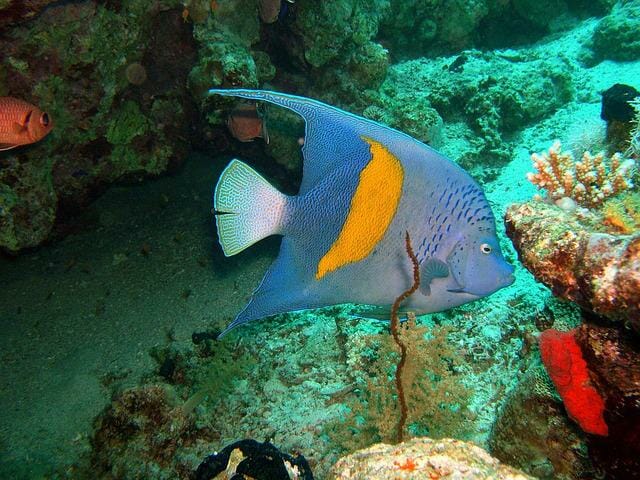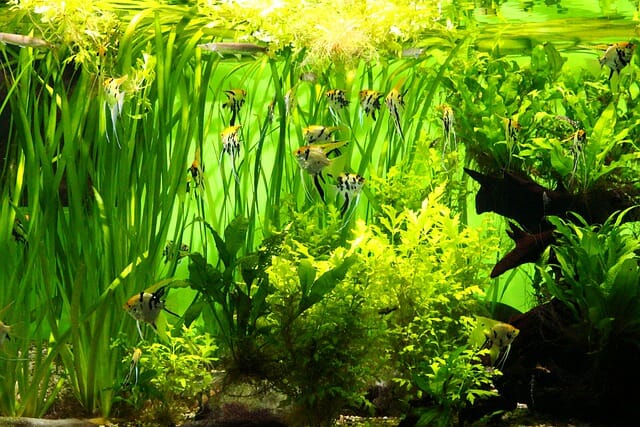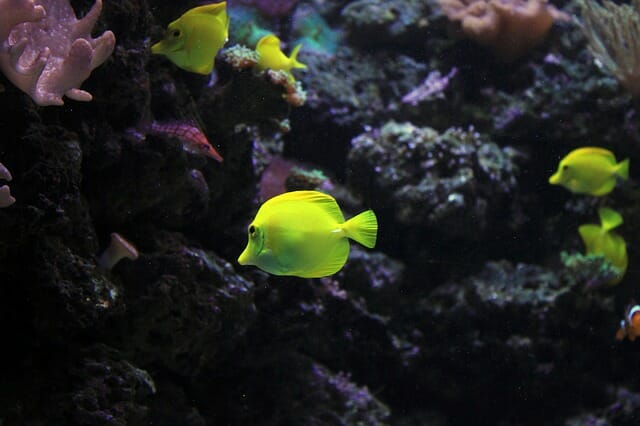Do Angelfish Eat Other Fish: Reasons, Prevention & Tankmates

Angelfish are a part of the cichlid family, and they are naturally inclined to consume other fish. However, most angelfish will not shy away from any fish that is fresh and swimming in the water. That being said, there are a few rare cases where an angelfish will feed on other fish – this is usually when the other fish has been injured or trapped in a tight space where it can’t escape.
Table of Contents
Why Do Angelfish Eat Smaller Fish?
Fish diets can vary depending on the environment they reside in. For example, big fish usually eat small fish because it’s easier to catch and consume these smaller prey items. This is primarily due to the size difference between large and small prey animals and their hunting strategies.
Territory
One aspect that can affect a fish’s diet is its territory. Certain fish will eat other fish based on their prey’s size, genetic makeup, and location. For example, certain species of barracuda have been known to hunt in groups and feed on smaller fishes such as sardines. In addition, some predatory fish will eat smaller fish as a sign of dominance or gain access to an area where they are not supposed to be.
Food Availability
The environment can also affect the availability of food items. For example, during certain times of the year, more prey may be available due to spawning activity or other natural processes. In addition, environmental changes such as drought can lead to less food being available for fish, which could impact their diet.
Food Scarcity
Angelfish may also attack other fish to fry and monopolize their food. This can happen if the angelfish’s food source is limited or they’re not getting enough nutrition from their eating. In these cases, it’s essential to provide plenty of fresh and varied foods for the angelfish to eat.
Protection
Certain fish, such as seabass, can prey on larger animals to protect themselves or their territory. For example, seabass may feed on sharks to deter them from attacking their schools of fish.
Space Constraints
Since angelfish live close quarters with each other, they may become territorial if their environment isn’t adequately spaced out. This means having a well-planned aquarium layout, including plenty of open space for the fish to swim and play.
Stress
Angelfish can also become aggressive towards other fish to deal with any stress that they may be experiencing. This includes changing water temperatures, new companions being added to the tank, or poor environmental conditions. In these cases, it’s essential to keep an eye on the angelfish and provide them with some relief if needed.

Incorrect Male to Female Ratio
Another possible cause of aggression in angelfish is an incorrect male to female ratio. This means that there are too many males in the tank and not enough females. This can lead to territorial disputes between the males as they try to establish dominance over each other. Therefore, it’s essential to keep a close eye on the tank and ensure a proper balance of fish genders to avoid any potential conflict.
Can You Keep Angelfish With Other Fish?
Can you put other fish with angelfish in one tank? This question has no specific answer as it also depends on the individual’s angelfish behavior. For example, some angelfish varieties may be aggressive towards other fish, while others may be content living peacefully alongside their companions. Therefore, it’s essential to remember that angelfish can grow huge 6 inches if not correctly cared for, so always have a plan in place should one escape or get out of its aquarium.
Are Angelfish Cannibals?
This question has no definitive answer as it depends on the individual angelfish. Some individuals may act aggressively towards other fish, while others may only feed on small prey items. But, again, it’s essential to remember that some angelfish can grow quite large, so always have a plan in place should one escape or get out of its aquarium.
Do Angelfish Eat Their Babies?
There is no definitive answer to this question as it also depends on the individual angelfish. Some individuals may eat their young, while others may care for them until they are larger and can fend for themselves. But, again, it’s essential to keep in mind that some angelfish can grow quite large so always have a plan in place should one escape or get out of its aquarium.
What Fish Should Not Be Kept With Angelfish?
A few fish may not be able to live with angelfish. These include smaller tropical fish, gouramis, and other perch family members. Other fish that may have problems living with angelfish include corydoras catfish, kuhli loaches (typically), barbs, and mollies.
Fish That Can Harm Angelfish
There are also a few fish that can potentially harm angelfish. These include larger tropical fish, cichlids, and other perch family members. Other predatory fish that may threaten angelfish have gars, sailfinned catfishes (such as Aulonocara sp.), and others of their ilk. It’s essential to keep an eye on your angelfish and make sure they’re not getting overwhelmed by too many predators or other fish in the tank.
Fish That Angelfish Eat
While it’s not always easy to see, angelfish eat other fish in their tank. If you notice that one or more of your fish is regularly disappearing, this may be a sign that angelfish targets them as prey. In these cases, removing any smaller fish from the tank is essential and relieves the angelfish if needed.
How Do I Keep My Angelfish From Eating Each Other?
While it’s not always easy to keep angelfish from eating each other, there are a few things that you can do:
- Ensure that the tank is well-balanced in terms of fish genders and ensure there are enough smaller fish for them to prey on.
- Provide plenty of hiding spots for your fish so they have something to escape Predators like angelfish and larger fishes.
- Monitor your fish constantly and remove any that appear to be in danger of being eaten.

Do Not Restrict Its Movement
One common problem that angelfish can experience is movement problems. This occurs when they cannot move around or explore their tank as they should. For example, if your fish feels restricted in its ability to move, it may start to feel stressed and resort to eating its tankmates to survive. In some cases, moving the entire tank (or at least part of it) may be necessary for the angelfish to re-establish its territory.
Change Their Environment
One of the main reasons why angelfish may eat other fish is because they are looking for something new to explore their tank. If you provide ample hiding places and change up their environment regularly, this will help keep your angelfish from becoming bored and more likely to prey on other fish in the tank.
Tank Conditions
If you notice that your tank is not correctly conditioned, this can also lead to angelfish becoming aggressive and potentially eating other fish in the tank. In addition, make sure to check the water quality, temperature, and CO2 levels regularly to keep your tank running smoothly.